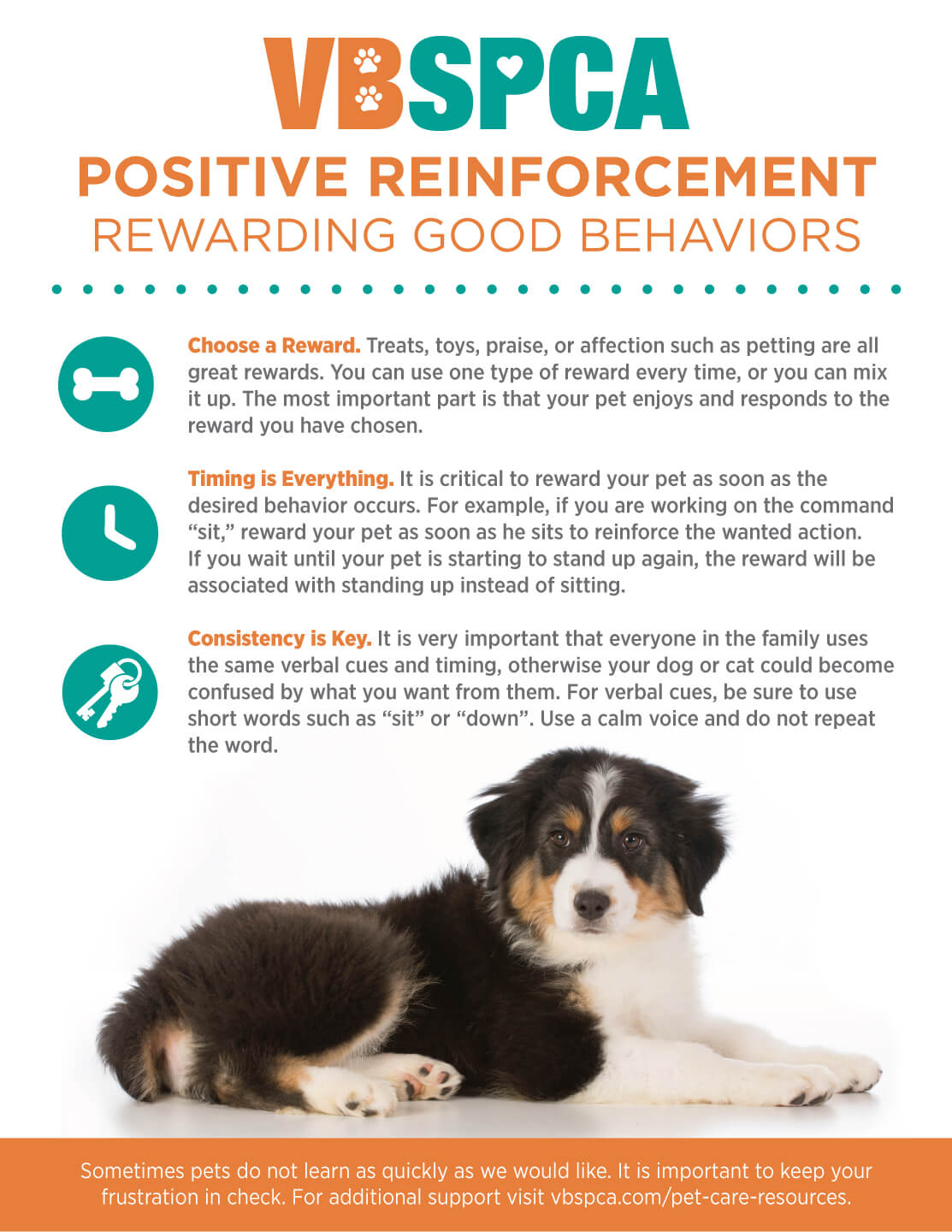Positive reinforcement is the preferred training method at the Virginia Beach SPCA. This training approach helps you set the foundation for good behavior while also establishing a strong, trusting connection between you and your pet. By using positive reinforcement methods, your dog or cat will learn your house and lifestyle rules while also enjoying the fun of extra time with you! Then, once you’ve mastered the basics, you can use this same approach to teach your pet tricks.
The approach to positive reinforcement is simple – you reward your pet immediately following a wanted behavior. Let’s say you have been working with your dog to teach them to sit. As soon as your pup sits, give them a reward such as a treat. With practice and consistency, your dog or cat will begin to associate positive things with the wanted behavior, making them more likely to repeat the behavior.
Choose a Reward
Different pets respond to different rewards. Rewards include treats, toys, praise, or affection such as petting. You can use one type of reward every time, or you can mix it up. The most important part is that your pet enjoys and responds to the reward you have chosen.
If you are using treats as a reward, be sure to use small, soft pieces of food that your cat or dog can eat quickly. This will keep your pet engaged and focused on you and the treat. Treat rewards should also be accompanied with verbal praise, such as “good boy” in a happy tone of voice.
Timing is Everything
It is critical to reward your pet as soon as the desired behavior occurs. For example, if you are working on the command “sit,” reward your pet as soon as he sits to reinforce the wanted action. If you wait until your pet is starting to stand up again, the reward will be associated with standing up instead of sitting.
Consistency is Key
Consistency in your training will help your pet learn faster and reinforce wanted behaviors. It is very important that everyone in the family uses the same verbal cues and timing, otherwise your dog or cat could become confused by what you want from them. For verbal cues, be sure to use short words such as “sit” or “down”. Use a calm voice and do not repeat the word.
Once your pet is reliably repeating the behavior you want, you can gradually reduce how often they are given physical rewards like treats or toys, but be sure to continue verbal praise. Don’t reduce the frequency of rewards too quickly – otherwise, your pet could become confused or frustrated. Your pet needs to understand that he will eventually be rewarded for correct behaviors.
Sometimes pets do not learn as quickly as we would like. It is important to keep your frustration in check. Take a break from training, and if you feel like you are not making the proper amount of progress, consider getting help from one of our recommended professional trainers.





Last Updated: June 3, 2022 by vbspcaadmin
Positive Reinforcement | Rewarding Good Behaviors
Positive reinforcement is the preferred training method at the Virginia Beach SPCA. This training approach helps you set the foundation for good behavior while also establishing a strong, trusting connection between you and your pet. By using positive reinforcement methods, your dog or cat will learn your house and lifestyle rules while also enjoying the fun of extra time with you! Then, once you’ve mastered the basics, you can use this same approach to teach your pet tricks.

The approach to positive reinforcement is simple – you reward your pet immediately following a wanted behavior. Let’s say you have been working with your dog to teach them to sit. As soon as your pup sits, give them a reward such as a treat. With practice and consistency, your dog or cat will begin to associate positive things with the wanted behavior, making them more likely to repeat the behavior.
Choose a Reward
Different pets respond to different rewards. Rewards include treats, toys, praise, or affection such as petting. You can use one type of reward every time, or you can mix it up. The most important part is that your pet enjoys and responds to the reward you have chosen.
If you are using treats as a reward, be sure to use small, soft pieces of food that your cat or dog can eat quickly. This will keep your pet engaged and focused on you and the treat. Treat rewards should also be accompanied with verbal praise, such as “good boy” in a happy tone of voice.
Timing is Everything
It is critical to reward your pet as soon as the desired behavior occurs. For example, if you are working on the command “sit,” reward your pet as soon as he sits to reinforce the wanted action. If you wait until your pet is starting to stand up again, the reward will be associated with standing up instead of sitting.
Consistency is Key
Consistency in your training will help your pet learn faster and reinforce wanted behaviors. It is very important that everyone in the family uses the same verbal cues and timing, otherwise your dog or cat could become confused by what you want from them. For verbal cues, be sure to use short words such as “sit” or “down”. Use a calm voice and do not repeat the word.
Once your pet is reliably repeating the behavior you want, you can gradually reduce how often they are given physical rewards like treats or toys, but be sure to continue verbal praise. Don’t reduce the frequency of rewards too quickly – otherwise, your pet could become confused or frustrated. Your pet needs to understand that he will eventually be rewarded for correct behaviors.
Sometimes pets do not learn as quickly as we would like. It is important to keep your frustration in check. Take a break from training, and if you feel like you are not making the proper amount of progress, consider getting help from one of our recommended professional trainers.
Category: VBSPCA News
Search
Ways to Give
Annual Sponsors
To view our Donor Privacy Policy, click here.